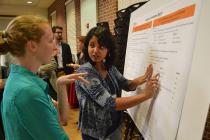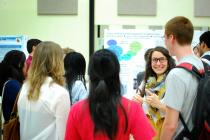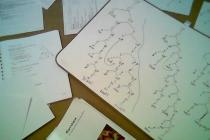Semantics
Precise meanings and loose concepts: Roles for underdetermination and imprecision in formal semantics
Title: Event Semantics in Text Constructions, Vision, and Human-Robot Dialogue
Angela Xiaoxue He will present her dissertation defense on "Verb Learning Under Guidance: Syntax-to-Semantics Inferences."
Psycholinguistics Lab meeting. Fridays, 12:00 - 1:30. Linguistics Dept seminar room, 1108B Marie Mount Hall.
On October 10th we'll have a double-header featuring Kate Harrigan, discussing her work on how children learn and understand very-hard-to-observe words, such as "want", "think", and "hope". Then Ellen Lau will talk about some of her recent work on ERPs and predictive processes ("Events vs. Entities with ERPs").
All welcome.
LSD marked the 1-year anniversary of the Maryland Language Science Center, showcasing many ideas and initiatives launched over the past year.











